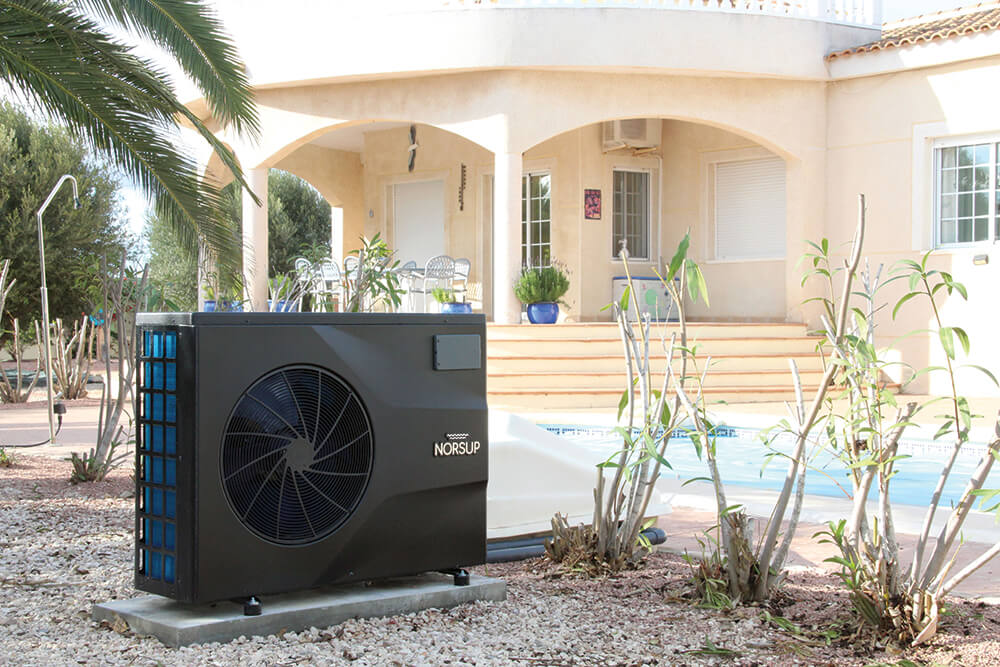Maximize Pool Comfort and Efficiency: Why Recommend Heat Pumps to Your Customers
Why Should You Recommend Investing in a Heat Pump to Your Customers?
Investing in a heat pump for your customers’ swimming pool is a decision that has numerous benefits. As an installer, understanding these benefits can help you guide your clients towards making an informed decision. Heat pumps offer efficient, cost-effective, and environmentally friendly solutions for heating swimming pools. Here's a deeper dive into why a swimming pool heat pump is a smart investment.
Types of Swimming Pool Heat Pumps
ON/OFF Heat Pumps
ON/OFF heat pumps are the more traditional choice. They are simpler in structure, often leading to lower purchase and installation costs. They operate on an 'all or nothing' basis - switching off when the set temperature is reached and restarting at full speed when the temperature drops. Although not as efficient as inverter models, they are a robust and reliable solution for many users.
Inverter Heat Pumps
Inverter heat pump technology is relatively new and offers significant advantages. Inverter pumps allow the fan and compressor to operate at variable speeds, adjusting the output very precisely to the actual demand of the pool. When the pool's set temperature is reached, the inverter pump reduces the output to between 25% and 50% of the maximum output, significantly increasing energy efficiency. At this output, the heat pump can achieve a COP (Coefficient of Performance) of up to 13, meaning it can deliver 13 kW of heat to the pool for every kW of electricity used.
Benefits of Inverter Heat Pumps
Energy Efficiency and Cost Savings
Switching from an ON/OFF heat pump to an inverter heat pump can save about 20% to 30% on electric power. Inverter pumps adjust the running frequency according to the ambient temperature and the target pool temperature, reducing output and power consumption when demand is low. This energy-efficient approach ensures your clients' pools are kept at a suitable temperature without unnecessary energy costs.
Improved Performance and Longevity
Inverter heat pumps use a DC motor, which rises slowly and avoids the high starting current typical of AC motors. This reduces the strain on the heat pump components, prolonging their lifespan and improving reliability. The average COP for an ON/OFF heat pump is about 5, whereas an inverter heat pump can achieve a COP of more than 12, offering superior performance.
Quiet Operation
Inverter heat pumps operate more quietly than traditional ON/OFF models. By adjusting the fan and compressor speeds, these pumps maintain lower noise levels, providing a more pleasant environment around the pool area.
Choosing the Right Heat Pump
Factors to Consider
When helping clients choose a heat pump, consider several key factors:
- Coefficient of Performance (COP): The higher the COP, the more efficient the unit.
- Device Power: Match the heat pump capacity to the pool volume. For example, a pool measuring 8 metres long, 4 metres wide, and 1.8 metres deep (57.6 m³) would require a heat pump with a capacity suited to this volume. Manufacturers usually provide a recommended output, such as 9 kW or 12 kW for this size pool.
Examples of Heat Pumps for Different Pool Sizes
- Pools up to 15 m³: The ECO heat pump, plug & play type, is ideal for small garden pools, including rack and strut pools. It features a titanium heat exchanger resistant to corrosion and pool chemicals.
- Pools 20-30 m³: The Flotide Inverter ABS type PX7/32 offers automatic adjustment of heating capacity based on weather conditions, reducing noise and energy consumption by up to 50%.
- Pools over 50 m³: The Norsup Silent-Pro fully inverter heat pump uses SmartGrid technology to regulate heating capacity based on demand, ensuring low noise levels and high efficiency.
Is It Worth your Clients Investing in a Pool Heat Pump?
Absolutely! Heat pumps are a worthwhile investment due to their low running costs and high energy efficiency. They allow your clients to enjoy warm pool water for most of the year without worrying about high energy bills. By choosing the right unit and using it correctly, your customers can achieve both comfort and cost-effectiveness, making heat pumps the ideal solution for any pool owner.
How Much Energy Can you Save When you Switch from an ON/OFF Heat Pump to an Inverter Heat Pump?
Switching to an inverter heat pump can lead to significant energy savings. An inverter heat pump adjusts its output based on the ambient temperature and the desired pool temperature, reducing power consumption and load on components when demand is low. This can save about 20% to 30% on electric power compared to an ON/OFF heat pump.
While investing in a heat pump, do not forget the necessary accessories for its installation. The bypass is a kit for pool heat pumps that allows you to control the flow of water to the pump. It allows you to quickly and efficiently prepare the pump for winter without disturbing the water flow to the pool, allowing you to efficiently maintain the unit.
Each installation requires an individual approach, so it is advisable to consult a specialist. Get in touch with us to find the perfect solution for your customers' needs!

